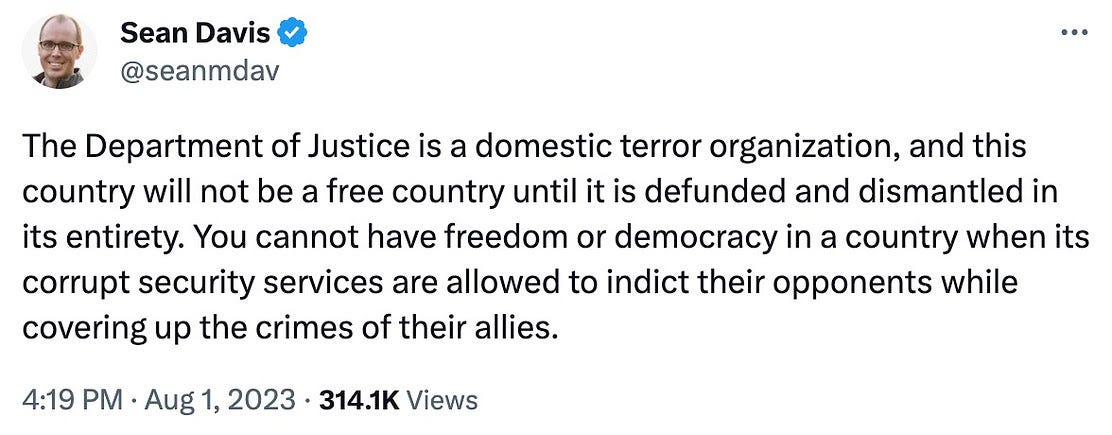Trump’s Trials Will Be a Step Toward Truth
They don’t have to convince everyone to save us all.
A YEAR AGO, I WAS WARY of indicting Donald Trump. I feared that charging him—though arguably the most deserved prosecution imaginable—would only strengthen him politically. It’s a little hard to recall now, but last year, Trump was in eclipse. In July 2022, half of GOP primary voters expressed a desire to move on from Trump. His anointed candidates fared poorly in November, and even some of his most ardent backers, including the Murdochs, were eyeing other options. If he could be relegated to the rear view window, I reasoned, even if (goddammit) it meant that he escaped liability for his crimes, it would be the best available outcome. An indictment, I feared, would spark a rally-round-Trump effect that would revive his fortunes among Republicans and thrust this viper back into our national life.
I was also concerned that, considering Trump’s modus operandi, his response to indictment would be a thoroughgoing assault on the rule of law.
Confronted with the possibility of a trial on federal charges, Trump would be a Vesuvius of trust-dissolving venom. He would impugn every aspect of the justice system. It will all be ‘corrupt’ and ‘a disgrace’ and ‘so unfair.’ The grievance/persecution narrative that he has already germinated would come into full bloom. . . .
The right wing infotainment circuit would transform Trump from a fading former leader into the sacrificial figure who is persecuted for his followers. The Christ imagery favored by his fervent disciples is not subtle. He takes the slings and arrows for conservative, God-fearing, Christian Americans.
Perhaps Merrick Garland had similar worries. He certainly seemed to drag his feet—until Trump’s florid criminality forced the DOJ’s hand. In the matter of the stolen classified documents, Trump defied a subpoena, attempted to conceal evidence (textbook obstruction), and displayed such contempt for national security and law that, in the words of former Trump Attorney General William Barr, “What is unjust is not prosecuting Trump at this stage.” Once Jack Smith was appointed to investigate the Mar-a-Lago documents case, it was untenable not to give him authority to look into the January 6th offenses as well.
As feared, the rally-round-Trump effect has happened. You can trace his comeback to the Mar-a-Lago search. The GOP base is once again glassy-eyed with zeal for their martyr/hero. This emphatically does not reflect poorly on the prosecutors (though the Bragg prosecution was ill-considered), but only on the Republicans whose instinct is to adore the most despicable human to hold high office in our lifetimes, or maybe ever.
Also, as predicted, the discrediting of our legal system has shifted into overdrive. The cowardly and cynical among Republican presidential candidates have cast aspersions on the Department of Justice. Ron DeSantis, though claiming not to have read the document, calls the latest indictment a “weaponization of federal law enforcement” that “represents a mortal threat to a free society.” Tim Scott leaped to whataboutism, citing the Hunter Biden case, and suggesting that “we’re watching Biden’s D.O.J. continue to hunt Republicans while protecting Democrats.”
Vivek Ramaswamy, the junior-varsity demagogue, offers that “the left calls January 6 a threat to ‘our democracy,’ but the ultimate threat is when politically unaccountable actors literally remove democratically elected officials from office.” And from what used to be the fever swamps but are now the MAGA influencer ranks comes this from the Federalist’s Sean Davis:
The party of law and order is now the party of nihilism and chaos.
So in some ways, this is a sum-of-all-fears moment. Trump, who had seemed diminished, has come roaring back to dominance of the GOP, despite the insurrection, despite the sexual assault verdict, despite the flagrant criminality on display with the classified documents, despite the dictator worship, despite promising to “terminate” the Constitution, and on and on and on. And, if nominated, he will face an elderly leader who is not, as of now, as popular as he deserves to be with voters. In short, we have a recipe for sleepless nights, again.
But there are reasons to believe that the coming months, which will be ugly, debased, and charged with anxiety about the future of this republic, will not necessarily end badly.
There are four and a half Republican presidential contenders who are telling the truth about Trump. Mike Pence, Asa Hutchinson, Chris Christie, and Will Hurd are solid. Nikki Haley, characteristically, is hedging (claiming that these cases are a distraction and that we “can’t keep dealing with this drama”), but she also sometimes stumbles into honesty. That is a departure from the norm during the 2016 primaries and during the Trump presidency. And it matters that these Republicans are making the case now, during the primaries, that Trump is unfit for office because some in the party will automatically tune out any critique of Trump if it seems that the beneficiary will be a Democrat in the general election. They are slightly more receptive to the argument when the beneficiary would be a different Republican. And if Trump becomes the nominee anyway, those who laid down a marker in the primaries cannot be credibly accused of carrying water for the Democrats.
Now, some will object, reasonably enough, that all of the Trump-critical candidates account for only about 11 percent of the primary vote according to recent polling. Less than ideal. But in our time, politics is a game of inches. Even supposing that the GOP nomination is no longer in play, the last two national elections were decided by 80,000 votes in 2016 and 44,000 votes in 2020. If just a small fraction of Republicans, to say nothing of independent voters, are dissuaded from supporting Trump because of the pending trials, it would make all the difference. A recent New York Times poll showed that 25 percent of the GOP electorate is not open to supporting Trump. Among that 25 percent, 49 percent think Trump is a criminal, and 29 percent (or about 7 percent of all Republican respondents) would vote for Biden over Trump in 2024.
Is that enough to keep the disaster of a second Trump term at bay? Probably not, because the structure of the Electoral College requires that the Democrat score at least a four point victory to prevail.
In our polarized information world, with millions getting only news that is politically palatable, it’s excruciatingly difficult to convey basic facts. But trials, especially trials that will dominate every single news outlet, are probably the one way to penetrate those hermetically sealed bubbles. As inconceivable as it seems to viewers of CNN and readers of the New York Times, millions of Americans do not know a fraction of the offenses Trump committed. And while millions won’t care, a saving few may. Through the trials, some who are currently in ignorance will learn facts that will disturb them. There will be no escaping the cataract of facts that will fill the airwaves in the coming months, and while spinners will work overtime to explain it all away, their task will be more challenging when there is testimony from Republicans and cross examination and sworn oaths. Our justice system is by no means perfect at revealing truth, but it’s far superior to social media or cable TV. If just a few tens of thousands of Americans in key states have their minds opened to new information, it could be enough to avoid an unthinkable outcome in 2024.
So we must strap in and prepare to play our part, mindful of the stakes, and welcoming a new ally in the battle for truth—the courts.






